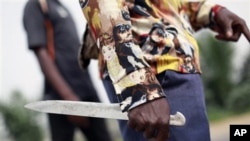The United Nations refugee agency is urging governments not to deport Ivorian refugees back to their country. The UNHCR says the situation in the Ivory Coast is becoming increasingly unstable and refugees could be in danger if returned.
The UN refugee agency notes countries surrounding Ivory Coast understand the seriousness of the situation and are behaving constructively toward the refugees.
It says Guinea and Liberia have formally declared they will recognize people fleeing the Ivory Coast as refugees on a prima facie basis. Meanwhile in Europe, it reports a number of countries are halting returns, including those of failed asylum seekers.
UNHCR spokesman, Andrej Mahecic, says his agency is issuing a worldwide appeal for other governments around the world to follow suit. He says it is asking them to suspend all returns to the Ivory Coast until the security and human rights situation there improves.
“Since the elections on the 28th of November, there have been numerous incidents of violence and reports of serious human rights violations, including against women, children and displaced people,” Mahecic said. “Abductions, disappearances, extrajudicial executions and acts of sexual violence have been reported in Abidjan and throughout the country.”
Currently the UN refugee agency reports about 30,000 refugees have fled to Liberia, and around 340 to Guinea. It says 18,000 people remain displaced internally in western parts of the Ivory Coast.
The United Nations and International community agree that opposition leader, Alassane Ouattara, won the widely contested election. But, the incumbent, Laurent Gbagbo refuses to give up power.
Many people fear a continuing standoff between these two rivals and their supporters could provoke another civil war in the country. In the meantime, instability and violence is growing.
UN Human Rights spokesman, Rupert Colville, says the Human Rights Office has received reports of 13 new killings in the past week. He says this brings the total number of deaths to at least 260 since mid-December.
“Among these 13 new killings, there was one woman. She was slashed to death with machetes. Other bodies were found with wounds, several were killed with gunfire, one or two others with machetes. One had his throat slit and another was beaten to death,” Colville stated.
In addition, the United Nations reports seven new cases of disappearances for a total of 68 and 23 cases of sexual assault.
On Wednesday, Colville says human rights workers tried, for the second time, to visit the alleged third mass grave, which was reported earlier this month. But, he says, hostile villagers at the alleged grave site blocked the mission.
UN Urges Countries Not to Deport Refugees to Ivory Coast












